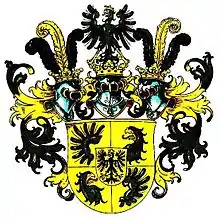Pückler
The House of Pückler, with branches named Pückler-Muskau, Pückler-Burghauss (Pückler-Burghauß), Pückler-Limpurg and Pückler-Groditz, was an old and influential German noble family which originated from Silesia. The Imperial County of Pückler-Limpurg was mediatized by Württemberg when the Holy Roman Empire came to an end in 1806. As immediate, that branch belonged to the high nobility, but it became extinct in the male line in 1963.

Coat of Arms of the Counts of Pückler (1690)
| Origin | |
|---|---|
| Language(s) | German |
| Meaning | ? |
| Region of origin | Silesia |
| Other names | |
| Variant form(s) | Pokeler (1365) |
Notable members
- Count Carl Friedrich of Pückler-Burghauss, Baron of Groditz (born 1886, Friedland, Silesia, died 1945, Tschimelitz)
- Erdmann Graf von Pückler-Limpurg (1792–1869)
- Erdmann von Pückler (1832–1888)
- Heinrich von Pückler (1835–1897)
- Hermann, Prince von Pückler-Muskau (1785, Muskau Castle, Bad Muskau - 1871), German nobleman, artist, famous for the Muskau Park (Polish: Park Mużakowski)
- Karl von Pückler-Burghauß (1817–1899)
- Walter von Pückler (1860–1924), antisemitic agitator
This article is issued from Wikipedia. The text is licensed under Creative Commons - Attribution - Sharealike. Additional terms may apply for the media files.